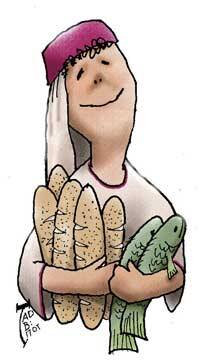Always Enough
There are more hungry people in the world than ever before, a fact reported by the United Nations Food and Agriculture Organization at its meeting in June. One-sixth of the planet’s population is going hungry. The hardest hit live in the developing world: 642 million people are malnourished in Asia and the Pacific. But developed countries are not immune; some 15 million go wanting in the richest countries of the world. This hunger crisis is not due to poor harvests and insufficient food. The global economic slowdown, coupled with persistently high food prices, has pushed some 100 million more people into chronic hunger and poverty this year. During the Angelus address on the feast of Corpus Christ, June 14, Pope Benedict XVI decried this “absolutely unacceptable situation.” Today’s readings are both challenging and comforting in light of the present food crisis.
The readings tell of two extraordinary acts of feeding hungry crowds, one by Elisha and one by Jesus. In the first, a man brings 20 loaves of barley bread as “first fruits” to Elisha. The setting is likely a shrine, and the bread is intended to be offered to God or placed as showbread, to be eaten later by the temple functionaries. The offering of first fruits, the best of the harvest, was a way to express gratitude to God and ask God’s blessing on the remainder. It is surprising that Elisha tells the man offering the bread to give it to the people to eat instead. Only an extraordinary situation of hunger would demand such an action. Elisha’s servant does not object, but worries that there will still not be enough to feed 100 people. Quoting an unknown saying, Elisha insists there will be enough and even some left over. And there is.
A similar story is told in the Gospel, but Jesus faces 5,000 hungry people. He and the disciples explore possible solutions. They could buy food, but where would they find a sufficient stock? Even if they could find it, they do not have enough money for the purchase. There is a boy with five loaves and two fish, but the disciples reason: What good are these for so many? They are fixated on the enormity of the need and the scarcity of the resources.
At Jesus’ urging, they entrust to him the boy’s loaves and fishes. He instructs them to invite the people into a position of trust and receptivity to God’s gracious care. Reclining on the grass is evocative of Psalm 23, which expresses trust in God who leads the people to green pastures and provides for all their needs. Taking the loaves and giving thanks, Jesus rejoices in the abundance that God has given and distributes the bread to all until they are satisfied. He then directs the disciples to gather the leftovers, which fill 12 baskets.
Both readings urge us to take extraordinary actions to meet an urgent need. Global efforts to eradicate hunger can begin with one courageous boy willing to relinquish his few loaves and fishes, or one man making an offering to God, willing to let his gift be redirected to the people and to trust that in God’s hands there will be enough for all. Jesus reorients his disciples away from the inscrutable problem of scarcity and instead gives thanks for the abundance of God’s provision. The resources to feed all, and for all to be satisfied, lie within the community. Jesus’ careful attention to the fragments left over also directs us to prevent wastefulness. Through such extraordinary responses to divine abundance, God is able to “satisfy the desire of every living thing” (Ps 145:16).
This article also appeared in print, under the headline “Always Enough,” in the July 20, 2009, issue.








